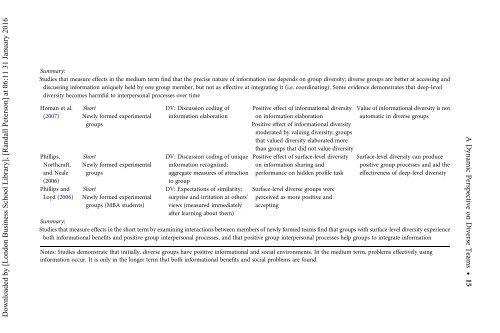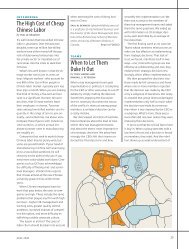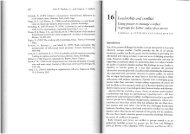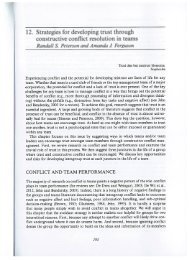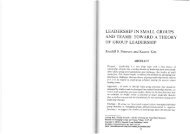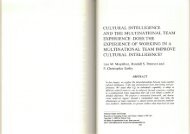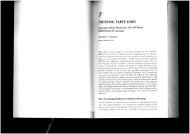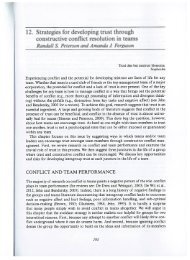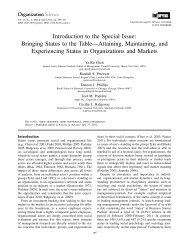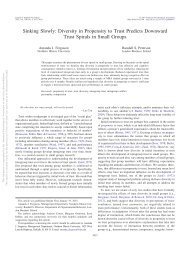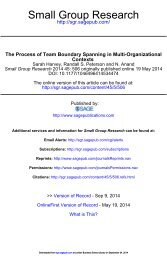A Dynamic Perspective on Diverse Teams: Moving From The Dual Process Model to A Dynamic Coordination-Based Model of Diverse Team Performance - Kannan Srikanth, Sarah Harvey & Randall Peterson
The existing literature on diverse teams suggests that diversity is both helpful to teams in making more information available and encouraging creativity and damaging to teams in reducing cohesion and information sharing. Thus the extant literature suggests that diversity within teams is a double-edged sword that leads to both positive and negative effects simultaneously.
The existing literature on diverse teams suggests that diversity is both helpful to teams in making more information available and encouraging creativity and
damaging to teams in reducing cohesion and information sharing. Thus the
extant literature suggests that diversity within teams is a double-edged sword
that leads to both positive and negative effects simultaneously.
Create successful ePaper yourself
Turn your PDF publications into a flip-book with our unique Google optimized e-Paper software.
Downloaded by [L<strong>on</strong>d<strong>on</strong> Business School Library], [<strong>Randall</strong> Peters<strong>on</strong>] at 06:11 31 January 2016<br />
Summary:<br />
Studies that measure effects in the medium term find that the precise nature <strong>of</strong> informati<strong>on</strong> use depends <strong>on</strong> group diversity; diverse groups are better at accessing and<br />
discussing informati<strong>on</strong> uniquely held by <strong>on</strong>e group member, but not as effective at integrating it (i.e. coordinating). Some evidence dem<strong>on</strong>strates that deep-level<br />
diversity becomes harmful <strong>to</strong> interpers<strong>on</strong>al processes over time<br />
Homan et al.<br />
(2007)<br />
Phillips,<br />
Northcraft,<br />
and Neale<br />
(2006)<br />
Phillips and<br />
Loyd (2006)<br />
Short<br />
Newly formed experimental<br />
groups<br />
Short<br />
Newly formed experimental<br />
groups<br />
Short<br />
Newly formed experimental<br />
groups (MBA students)<br />
DV: Discussi<strong>on</strong> coding <strong>of</strong><br />
informati<strong>on</strong> elaborati<strong>on</strong><br />
DV: Discussi<strong>on</strong> coding <strong>of</strong> unique<br />
informati<strong>on</strong> recognized;<br />
aggregate measures <strong>of</strong> attracti<strong>on</strong><br />
<strong>to</strong> group<br />
DV: Expectati<strong>on</strong>s <strong>of</strong> similarity;<br />
surprise and irritati<strong>on</strong> at others’<br />
views (measured immediately<br />
after learning about them)<br />
Positive effect <strong>of</strong> informati<strong>on</strong>al diversity<br />
<strong>on</strong> informati<strong>on</strong> elaborati<strong>on</strong><br />
Positive effect <strong>of</strong> informati<strong>on</strong>al diversity<br />
moderated by valuing diversity; groups<br />
that valued diversity elaborated more<br />
than groups that did not value diversity<br />
Positive effect <strong>of</strong> surface-level diversity<br />
<strong>on</strong> informati<strong>on</strong> sharing and<br />
performance <strong>on</strong> hidden pr<strong>of</strong>ile task<br />
Surface-level diverse groups were<br />
perceived as more positive and<br />
accepting<br />
Value <strong>of</strong> informati<strong>on</strong>al diversity is not<br />
au<strong>to</strong>matic in diverse groups<br />
Surface-level diversity can produce<br />
positive group processes and aid the<br />
effectiveness <strong>of</strong> deep-level diversity<br />
Summary:<br />
Studies that measure effects in the short term by examining interacti<strong>on</strong>s between members <strong>of</strong> newly formed teams find that groups with surface-level diversity experience<br />
both informati<strong>on</strong>al benefits and positive group interpers<strong>on</strong>al processes, and that positive group interpers<strong>on</strong>al processes help groups <strong>to</strong> integrate informati<strong>on</strong><br />
Notes: Studies dem<strong>on</strong>strate that initially, diverse groups have positive informati<strong>on</strong>al and social envir<strong>on</strong>ments. In the medium term, problems effectively using<br />
informati<strong>on</strong> occur. It is <strong>on</strong>ly in the l<strong>on</strong>ger term that both informati<strong>on</strong>al benefits and social problems are found.<br />
A <str<strong>on</strong>g>Dynamic</str<strong>on</strong>g> <str<strong>on</strong>g>Perspective</str<strong>on</strong>g> <strong>on</strong> <strong>Diverse</strong> <strong><strong>Team</strong>s</strong> † 15


